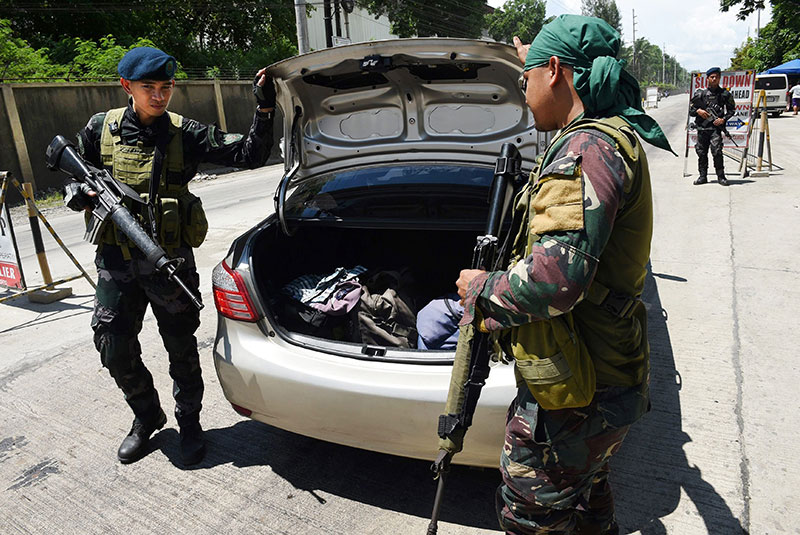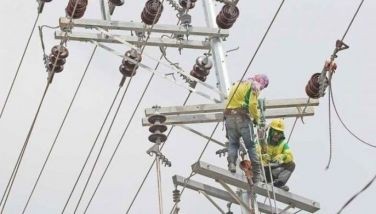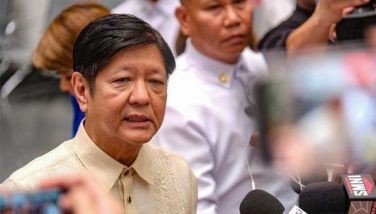AFP sees more martial law arrests

Armed Forces of the Philippines (AFP) Eastern Mindanao Command deputy chief Brig. Gen. Gilbert Gapay said there will be no letup in tracking down the over 300 personalities listed in the arrest order issued by the Department of National Defense (DND) as administrator of martial law. AFP, File
DAVAO CITY, Philippines – Authorities are set to make more arrests as martial law continues to be implemented in Mindanao following clashes in Marawi City with the Maute group.
Armed Forces of the Philippines (AFP) Eastern Mindanao Command deputy chief Brig. Gen. Gilbert Gapay said there will be no letup in tracking down the over 300 personalities listed in the arrest order issued by the Department of National Defense (DND) as administrator of martial law.
“As the implementation of martial law continues, it is expected that there will be more arrests in the coming days as tracking and monitoring are intensified against the persons listed in the two orders of arrest issued by the martial law administrator,” Gapay said.
The DND, using its martial law powers, has issued arrest orders against 310 alleged members, supporters, spies and couriers of four terrorist organizations in Mindanao.
All those in the list are accused of involvement in killings, kidnappings and bombings in Marawi City that altogether constitute the crime of rebellion under Article 134 of the Revised Penal Code.
Those to be arrested are tagged as members of the Maute group, Abu Sayyaf, Bangsamoro Islamic Freedom Fighters and Maguid group.
The arrest orders were issued after the proclamation of martial law placing the entire Mindanao region under military rule.
Security forces have rounded up several personalities under the arrest order.
They included Cayamora Maute, the father of brothers Omar and Abdullah leading the group of militants fighting government forces in Marawi; Ominta “Farhana” Romato, mother of the Maute brothers; their cousin Mohammad Naoim Maute and former Marawi City mayor Fajad Salic.
Gapay said the hunt for other Maute group members and supporters continues, particularly against the brothers Omar and Abdullah.
On top of the wanted list is Abu Sayyaf leader Isnilon Hapilon, whom authorities believe is the leader of the Islamic State (IS) in the region.
Those in the arrest list are accused of “sowing terror to the populace” with the common design or goal of allegedly committing rebellion “for the purpose of removing Mindanao from the territory of the government of the Republic of the Philippines or its laws by establishing an independent Islamic State and/or deprive the Chief Executive of his powers and prerogatives as President of the Republic.”
The arrest list contains 310 names of known members, supporters, spies and couriers of four terrorist organizations in Mindanao, particularly those directly involved in the clashes with government troops in Marawi City.
Gapay said there are about 10,000 checkpoints in eastern Mindanao with a total of 106 security operations to secure vital installations and critical infrastructure.
He said the military has established 3,628 informant networks to gather information against terrorists.
Gapay said 58 local government units in eastern Mindanao have imposed curfews implemented by the military and the Philippine National Police. This led to the arrest of 53 people violating the curfew hours, he said.
Copycat martial law
President Duterte imposed martial law across the entire region of Mindanao within hours after fighting broke out in Marawi City on May 23 in a bid to quickly crush the IS-inspired Maute group.
Duterte justified the declaration of martial law in Min-danao to contain the extremists who wanted to carve out a caliphate in the region.
He explained that he declared martial law because the AFP and the police told him that the crisis in Marawi City had reached its critical moment.
Duterte said he was forced to cut short his visit to Moscow because of the deteriorating security situation back home.
Several sectors, including opposition lawmakers, filed a petition before the Supreme Court questioning the validity of the declaration of martial law.
Members of the opposition and civil society groups have questioned Duterte’s move and have also asked the Supreme Court to compel Congress to convene a joint session to review the President’s basis for his declaration.
The declaration has sparked fears of human rights abuses, but officials maintained that all actions related to martial law would comply with the Constitution.
Duterte said he is ready to pull out troops from Marawi City if ordered by the Supreme Court but warned that if he had to declare martial law again, he would do it his way and it could be a “copycat” of that of the late strongman Ferdinand Marcos.
“If they do not like it, if they (Supreme Court) say there is no factual basis, then I’m ready to order the military to withdraw. We will let them be if they can. If the Supreme Court says it’s wrong, I will withdraw,” Duterte told reporters in Butuan City yesterday.
Duterte said he has no problem if the judiciary rules against his martial law declaration, saying he can survive without it.
He maintained that terrorists and rebels in Marawi are committing rebellion, one of the conditions that can justify the declaration of martial law.
“If that rebellion burns Mindanao. I’ll be forced to declare martial law again. This time, I will do it on my own to preserve the nation. I’ll not consult anybody. There’s no telling when it will end,” Duterte said.
“Then it could be a copycat of Marcos. Wala akong magawa eh (I was left with no choice),” he added.
Marcos placed the entire nation under martial law in 1972 supposedly to curb the threat posed by communist rebels. Critics said the declaration allowed human rights abuses, enforced disappearances and persecution of the political opposition.
Although nominally lifted in 1981, the martial law apparatus continued to hold sway until Marcos was ousted from power in 1986.
Duterte also responded to justices who have questions about his administration’s claim that there was a rebellion in Mindanao.
“What do you think? What do you want? That they devour half of Mindanao before we can call it a true blue rebellion?” he asked.
Duterte also chided critics of martial law, calling them “crybabies.”
“They think the government is not doing anything right. Everything that we do is wrong and most of the time, they are the crybabies,” he said.
Asked when he would lift martial law in Mindanao, Duterte replied: “The martial law won’t be lifted until the fighting is over.”
How long?
There had been questions on how long martial law would prevail in Mindanao. Under the Constitution, martial law should only last for 60 days.
Administration allies led by Speaker Pantaleon Alvarez said they are open to extending martial law in Mindanao.
Alvarez said he wanted to extend martial law up to the end of the President’s term in 2022.
Senate President Aquilino Pimentel III, however, said any talk about extending martial law beyond the 60-day period should come only from the executive branch and not from Congress.
“This idea is something that should not come from us but from the President because he is the one who has all the intelligence reports,” Pimentel said over dwIZ radio.
He said any move to extend martial law would also have to be supported by an actual situation of rebellion or invasion as provided for in the Constitution.
“So let us just wait for the President to actually say this. Then we can talk about the desirability of granting the extension or not,” Pimentel said.
Sen. Joseph Victor Ejercito previously aired his desire to extend the martial law period if only to totally address the peace and order situation in Mindanao.
Ejercito said he would like to have another briefing by the security officials for the senators before the end of the 60-day period in order to determine the actual situation.
Pimentel welcomed the idea of having regular briefings from security officials so that Congress would know how martial law is being implemented, as well as the status of conflict in Marawi City and the rest of the region.
Sen. Francis Escudero said the extension of martial law beyond the 60-day period is not something that should be volunteered by any member of Congress.
He agreed with the observations that this is the sole prerogative of the executive branch and Congress’ only task is to decide on whether to grant this.
Escudero reiterated his position that martial law is unnecessary to quell the ongoing conflict in Marawi City.
He said the situation in Mindanao in general is no different from the time before martial law was declared and after it was implemented there.
According to Escudero, the soldiers were already in Mindanao even before martial law so there was actually no difference in the lives of the people when the President declared military rule.
What would be different, Escudero said, is if martial law is declared in Metro Manila because the people in the national capital region are not used to seeing soldiers in the streets.
Escudero said that he does not like the idea of declaring martial law in general because it would only damage the image of the country before the international community and scare away tourists.
The fighting in Marawi has also triggered a humanitarian crisis with thousands of residents forced out of their homes.
The IS-aligned militants have displaced most of the more than 200,000 residents of Marawi City. More than 1,600 residents have been rescued from the scenes of heavy fighting, many of them still shell-shocked and starving while some were wounded.
The Department of Social Welfare and Development said more than 300,000 people were displaced by the clashes.
As of June 14, more than 69,055 families or 336,783 individuals are staying in 82 evacuation centers in Lanao del Sur and nearby provinces.
Some evacuees were accommodated in the towns of Saguiaran and Balo-i in Lanao del Norte and Baras in Iligan City.
In Shariff Aguak, Ma-guindanao, all of the 1,200 families staying in evacuation centers are farmers from villages in Marawi City who fled their homes to avoid being hit by airstrikes and ground operations of the military, according to an interfaith humanitarian mission who went to Mindanao to document the firefights between government forces and the Maute in Marawi City. – With Alexis Romero, Marvin Sy, Rhodina Villanueva
- Latest
- Trending




























